Schmitt C.B. (ed.) The Cambridge History of Renaissance Philosophy
Подождите немного. Документ загружается.

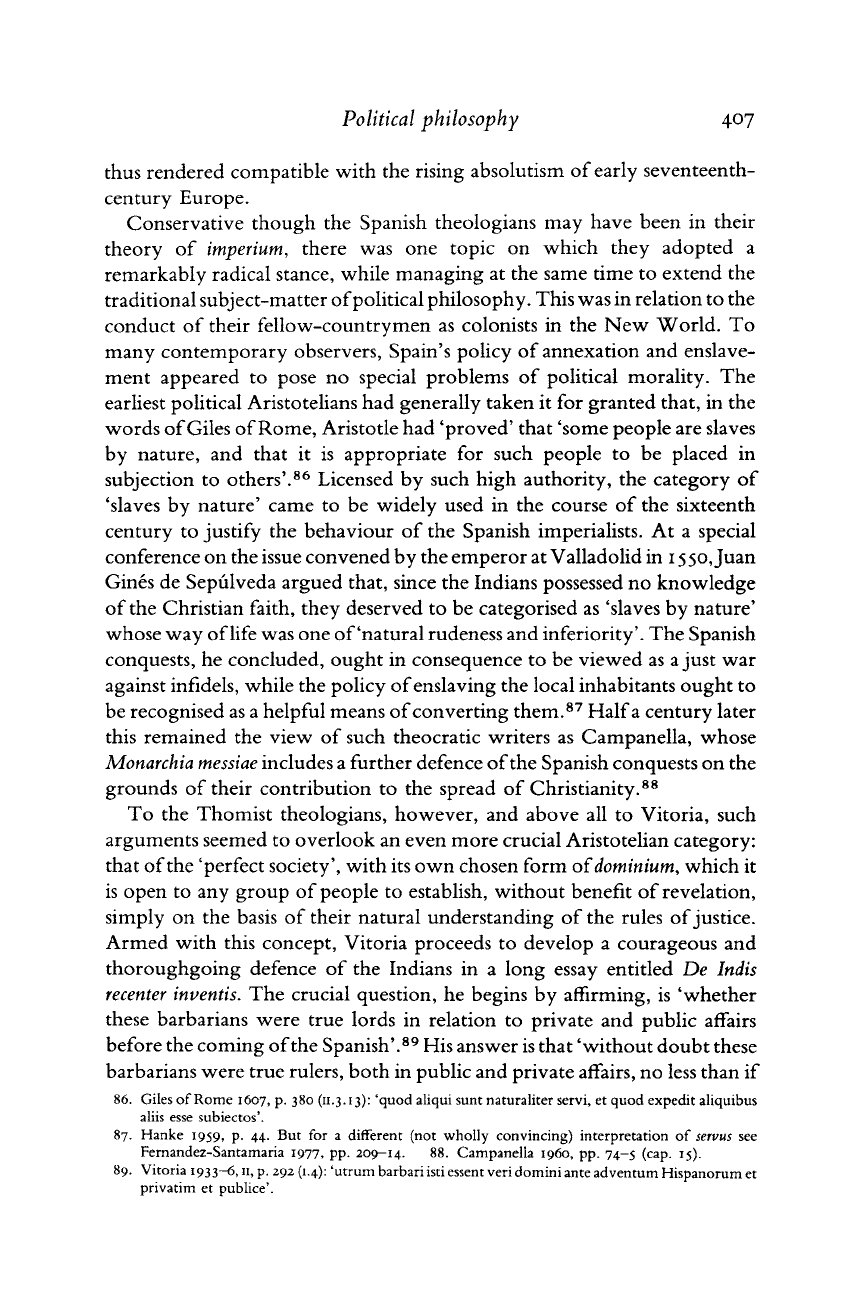
Political
philosophy
407
thus rendered compatible with the rising absolutism of
early
seventeenth-
century
Europe.
Conservative
though the Spanish theologians may have been in their
theory
of
imperium,
there was one topic on which they adopted a
remarkably
radical stance,
while
managing at the same time to extend the
traditional
subject-matter
of
political philosophy. This was in relation to the
conduct
of their fellow-countrymen as colonists in the New World. To
many
contemporary observers, Spain's policy of annexation and enslave-
ment appeared to pose no special problems of political morality. The
earliest
political Aristotelians had generally taken it for granted that, in the
words
of
Giles
of
Rome,
Aristotle had 'proved' that 'some people
are
slaves
by
nature,
and that it is appropriate for such people to be placed in
subjection to others'.
86
Licensed by such high authority, the category of
'slaves by
nature'
came to be widely used in the course of the sixteenth
century
to justify the behaviour of the Spanish imperialists. At a special
conference
on the issue convened by the
emperor
at
Valladolid in
15
50,
Juan
Gines de Sepulveda argued that, since the Indians possessed no knowledge
of
the Christian faith, they deserved to be categorised as 'slaves by
nature'
whose way
of
life
was one of'natural rudeness and inferiority'. The Spanish
conquests, he concluded, ought in consequence to be viewed as
a
just war
against
infidels,
while
the policy
of
enslaving the local inhabitants ought to
be recognised as a helpful means
of
converting them.
87
Haifa century later
this remained the view of such theocratic writers as Campanella, whose
Monarchia
messiae
includes
a
further defence
of
the
Spanish conquests on the
grounds of their contribution to the spread of Christianity.
88
To
the Thomist theologians, however, and above all to Vitoria, such
arguments
seemed to overlook an even more
crucial
Aristotelian category:
that
of
the
'perfect society', with its own chosen form
of
dominium,
which it
is open to any group of people to establish, without benefit of revelation,
simply on the basis of their natural understanding of the rules
of
justice.
Armed
with this concept, Vitoria proceeds to develop a courageous and
thoroughgoing defence of the Indians in a long essay entitled De
Indis
recenter
inventis. The crucial question, he begins by affirming, is 'whether
these barbarians were
true
lords in relation to private and public affairs
before
the coming
of
the
Spanish'.
89
His answer is that 'without doubt these
barbarians
were
true
rulers,
both in public and private affairs, no
less
than if
86. Giles of
Rome
1607, p. 380 (11.3.13):
'quod
aliqui
sunt
naturaliter
servi,
et
quod
expedit
aliquibus
aliis
esse
subiectos'.
87. Hanke 1959, p. 44. But for a
different
(not
wholly
convincing)
interpretation
of servus see
Fernandez-Santamaria 1977, pp.
209-14.
88. Campanella
i960,
pp. 74-5 (cap. 15).
89. Vitoria 1933-6,11, p. 292 (1.4):
'utrum
barbari
isti
essent
veri
domini
ante
adventum
Hispanorum
et
privatim et
publice'.
Cambridge Histories Online © Cambridge University Press, 2008
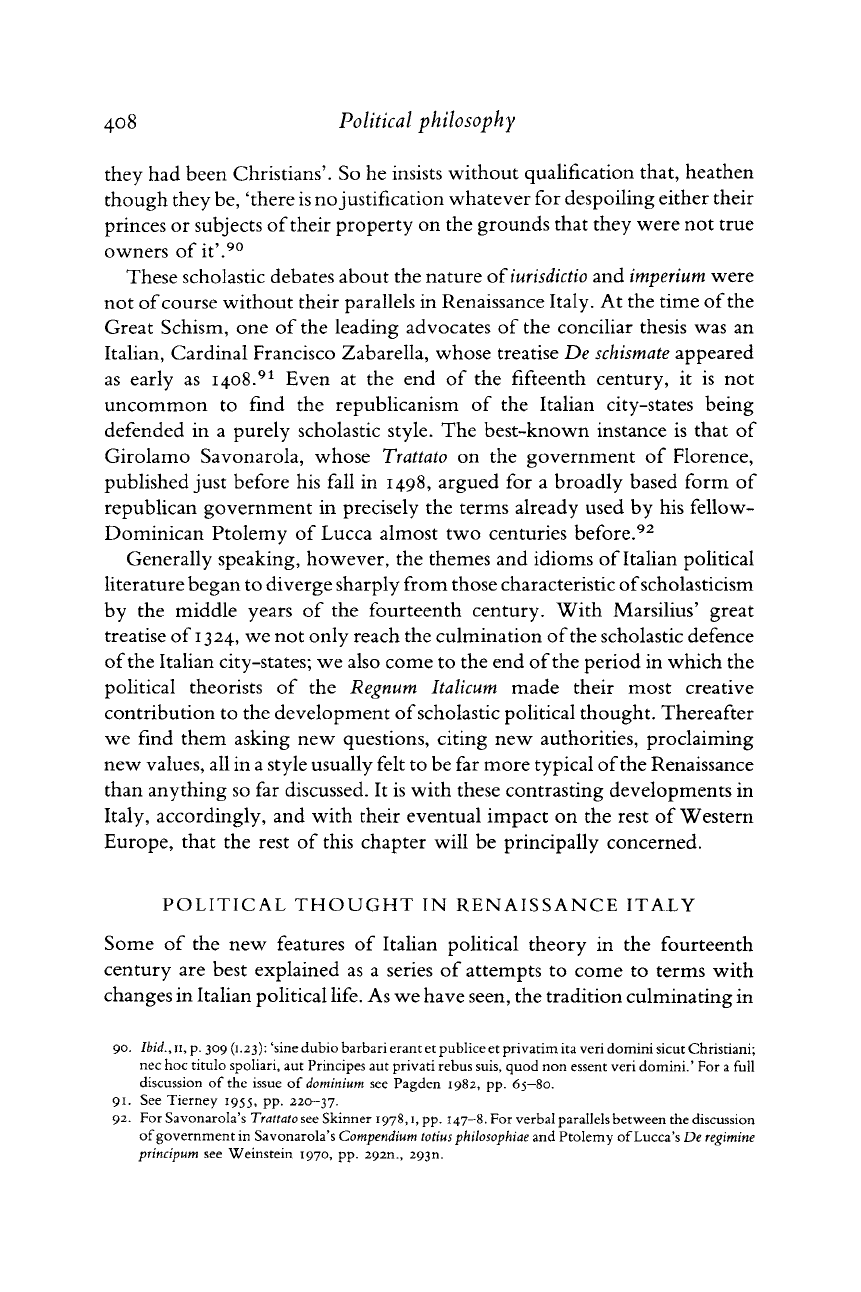
408
Political
philosophy
they had
been
Christians'. So he
insists
without qualification that, heathen
though they be, 'there is no justification whatever for
despoiling
either their
princes or subjects
of
their
property on the grounds that they were not true
owners of it'.
90
These scholastic debates about the nature of
iurisdictio
and imperium were
not
of
course
without their parallels in Renaissance Italy. At the time
of
the
Great
Schism, one of the leading advocates of the conciliar thesis was an
Italian,
Cardinal Francisco Zabarella,
whose
treatise De
schismate
appeared
as early as
1408.
91
Even at the end of the fifteenth century, it is not
uncommon to
find
the republicanism of the Italian city-states
being
defended in a purely scholastic style. The best-known instance is that of
Girolamo Savonarola,
whose
Trattato on the government of Florence,
published
just before his fall in 1498, argued for a broadly based form of
republican government in precisely the terms already used by his
fellow-
Dominican Ptolemy of
Lucca
almost two centuries before.
92
Generally speaking, however, the themes and
idioms
of Italian political
literature
began to diverge sharply from those
characteristic
of
scholasticism
by the middle years of the fourteenth century. With Marsilius' great
treatise
of
1324,
we not
only
reach the culmination
of
the scholastic defence
of
the Italian city-states; we also come to the end
of
the period in which the
political theorists of the Regnum Italicum made their most creative
contribution to the development
of
scholastic political thought. Thereafter
we
find
them asking new questions, citing new authorities, proclaiming
new values, all in a style usually
felt
to be far more typical
of
the Renaissance
than anything so far discussed. It is
with
these contrasting developments in
Italy,
accordingly, and
with
their eventual impact on the rest of Western
Europe,
that the rest of this chapter
will
be principally concerned.
POLITICAL
THOUGHT IN RENAISSANCE
ITALY
Some of the new features of Italian political theory in the fourteenth
century
are best explained as a series of attempts to come to terms
with
changes in Italian political
life.
As we have seen, the tradition culminating in
90. Ibid.,
11,
p. 309 (1.23):
'sine
dubio
barbari
erant
et
publiceet
privatim
ita
veri
domini
sicut
Christiani;
nec hoc
titulo
spoliari,
aut
Principes
aut privati
rebus
suis,
quod
non
essent
veri
domini.'
For a
full
discussion
of the
issue
of dominium see
Pagden
1982, pp.
65—80.
91.
See Tierney 1955, pp.
220-37.
92. For
Savonarola's
Trattato see
Skinner
1978,1, pp. 147-8. For verbal
parallels
between
the
discussion
of
government
in
Savonarola's
Compendium totius philosophiae and
Ptolemy
of Lucca's De regimine
principum see
Weinstein
1970, pp.
292n., 293n.
Cambridge Histories Online © Cambridge University Press, 2008
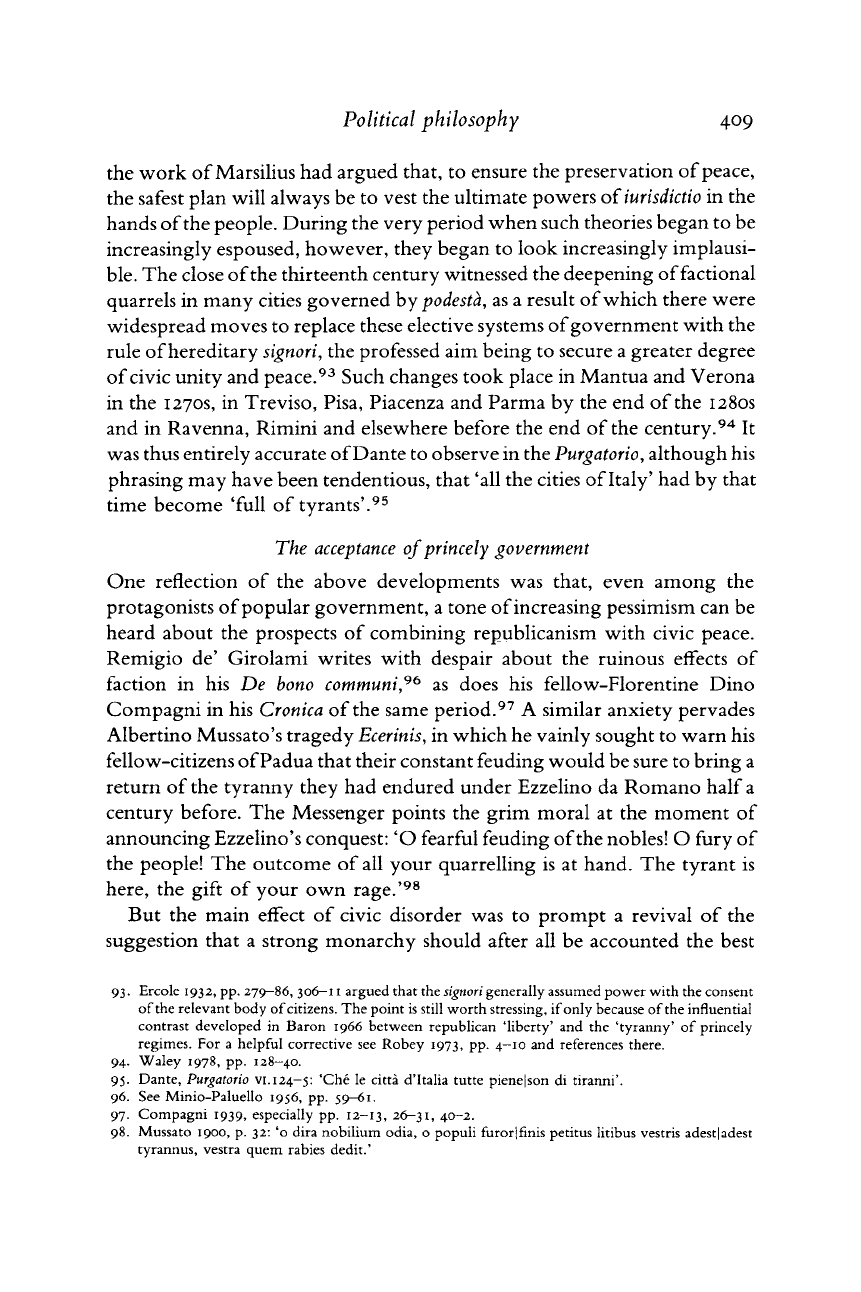
Political
philosophy
409
the work
of
Marsilius had argued that, to ensure the preservation of
peace,
the safest plan
will
always be to vest the ultimate powers of
iurisdictio
in the
hands
of
the people. During the very period
when
such theories began to be
increasingly espoused, however, they began to look increasingly implausi-
ble. The close
of
the thirteenth century witnessed the deepening
of
factional
quarrels
in many cities governed by
podestà,
as a result
of
which there were
widespread moves to replace these elective systems
of
government with the
rule
of
hereditary
signori,
the professed aim
being
to secure a
greater
degree
of
civic unity and peace.
93
Such changes took place in Mantua and Verona
in the
1270s,
in Treviso, Pisa, Piacenza and
Parma
by the end of the
1280s
and in Ravenna, Rimini and elsewhere before the end of the century.
94
It
was thus entirely
accurate
of
Dante to observe in the
Purgatorio,
although his
phrasing may have been tendentious, that 'all the cities
of
Italy'
had by that
time become
'full
of tyrants'.
95
The
acceptance
of
princely
government
One reflection of the above developments was that, even among the
protagonists
of
popular
government, a tone
of
increasing pessimism can be
heard
about the prospects of combining republicanism with civic peace.
Remigio de' Girolami writes with despair about the ruinous effects of
faction in his De
bono
communi,
96
as does his fellow-Florentine
Dino
Compagni in his
Cronica
of the same period.
97
A similar anxiety pervades
Albertino Mussato's tragedy
Ecerinis,
in which he vainly sought to warn his
fellow-citizens
of
Padua
that their constant
feuding would
be sure to bring a
return
of the tyranny they had endured under Ezzelino da Romano half
a
century
before. The Messenger points the grim moral at the moment of
announcing Ezzelino's conquest: 'O fearful
feuding
of
the nobles! O fury of
the people! The outcome of all your quarrelling is at hand. The tyrant is
here,
the gift of your own
rage.'
98
But
the main effect of civic disorder was to prompt a revival of the
suggestion that a strong monarchy should after all be accounted the best
93. Ercole 1932, pp.
279-86,
306-11
argued
that the signori
generally
assumed
power with
the
consent
of the
relevant
body of
citizens.
The
point
is
still
worth
stressing,
if
only
because
of the
influential
contrast
developed
in Baron 1966
between
republican
'liberty' and the 'tyranny' of
princely
regimes.
For a
helpful
corrective
see Robey 1973, pp. 4-10 and
references
there.
94. Waley 1978, pp.
128-40.
95. Dante, Purgatorio vi. 124-5: 'Che le
città
d'Italia
tutte
piene|son
di
tiranni'.
96. See
Minio-Paluello
1956, pp. 59—61.
97. Compagni 1939,
especially
pp. 12—13, 26—31, 40-2.
98.
Mussato
1900, P- 32: 'o dira
nobilium
odia,
o
populi
furor|finis
petitus
litibus
vestris
adest|adest
tyrannus,
vestra
quern
rabies
dedit.'
Cambridge Histories Online © Cambridge University Press, 2008
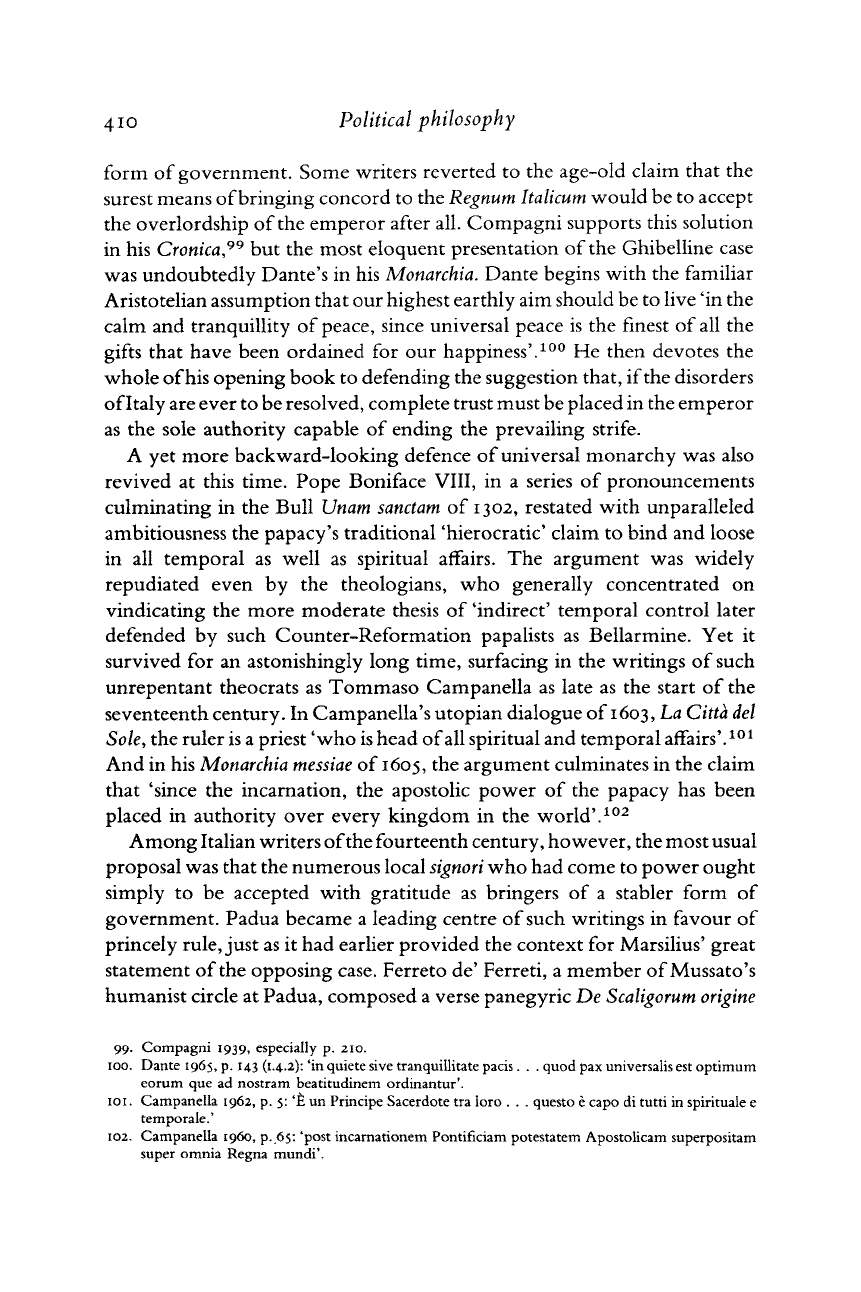
4io
Political
philosophy
form of government. Some writers reverted to the age-old claim that the
surest means
of
bringing concord to the Regnum Italicum
would
be to accept
the overlordship of the emperor after all. Compagni supports this solution
in his
Cronica,"
but the most eloquent presentation of the
Ghibelline
case
was undoubtedly Dante's in his
Monarchia.
Dante
begins
with
the familiar
Aristotelian assumption that our highest earthly aim should be to
live
'in the
calm and tranquillity of peace, since universal peace is the
finest
of all the
gifts
that have been ordained for our happiness'.
100
He then devotes the
whole
of
his
opening
book to
defending
the suggestion that,
if
the disorders
of
Italy
are
ever to be resolved, complete trust must be placed in the emperor
as the
sole
authority capable of
ending
the prevailing strife.
A
yet more backward-looking defence of universal monarchy was also
revived at this time. Pope Boniface
VIII,
in a series of pronouncements
culminating in the Bull Unam
sanctam
of
1302,
restated
with
unparalleled
ambitiousness the papacy's traditional
'hierocratic'
claim to bind and
loose
in all temporal as
well
as spiritual affairs. The argument was
widely
repudiated
even
by the theologians, who generally concentrated on
vindicating the more moderate thesis of 'indirect' temporal control later
defended by such Counter-Reformation papalists as Bellarmine. Yet it
survived for an astonishingly
long
time, surfacing in the writings of such
unrepentant theocrats as Tommaso Campanella as late as the
start
of the
seventeenth century. In Campanula's Utopian dialogue of
1603,
La Citta del
Sole,
the ruler is a priest 'who is head
of
all spiritual and temporal affairs'.
101
And in his
Monarchia
messiae
of
1605,
the argument culminates in the claim
that
'since the incarnation, the apostolic power of the papacy has been
placed in authority over every kingdom in the world'.
102
Among Italian writers
of
the fourteenth century, however, the most usual
proposal was that the numerous local
signori
who had come to power ought
simply to be accepted
with
gratitude as bringers of a stabler form of
government. Padua became a leading centre of such writings in favour of
princely
rule,
just as it had earlier provided the context for Marsilius' great
statement
of
the
opposing
case.
Ferreto
de'
Ferreti,
a member
of
Mussato's
humanist circle at Padua, composed a verse panegyric De
Scaligorum
origine
99.
Compagni
1939,
especially
p. 210.
100.
Dante
1965, p. 143
(1.4.2):
'in
quiete
sive
tranquillitate
pacis
. . .
quod
pax
universalis
est
optimum
eorum
que ad
nostram
beatitudinem
ordinantur'.
101.
Campanella
1962, p. 5: 'E un
Principe
Sacerdote
tra
loro
. . .
questo
e
capo
di
tutti
in
spirituale
e
temporale.'
102.
Campanella
i960,
p. 65:
'post
incarnationem
Pontificiam
potestatem
Apostolicam
superpositam
super
omnia
Regna
mundi'.
Cambridge Histories Online © Cambridge University Press, 2008
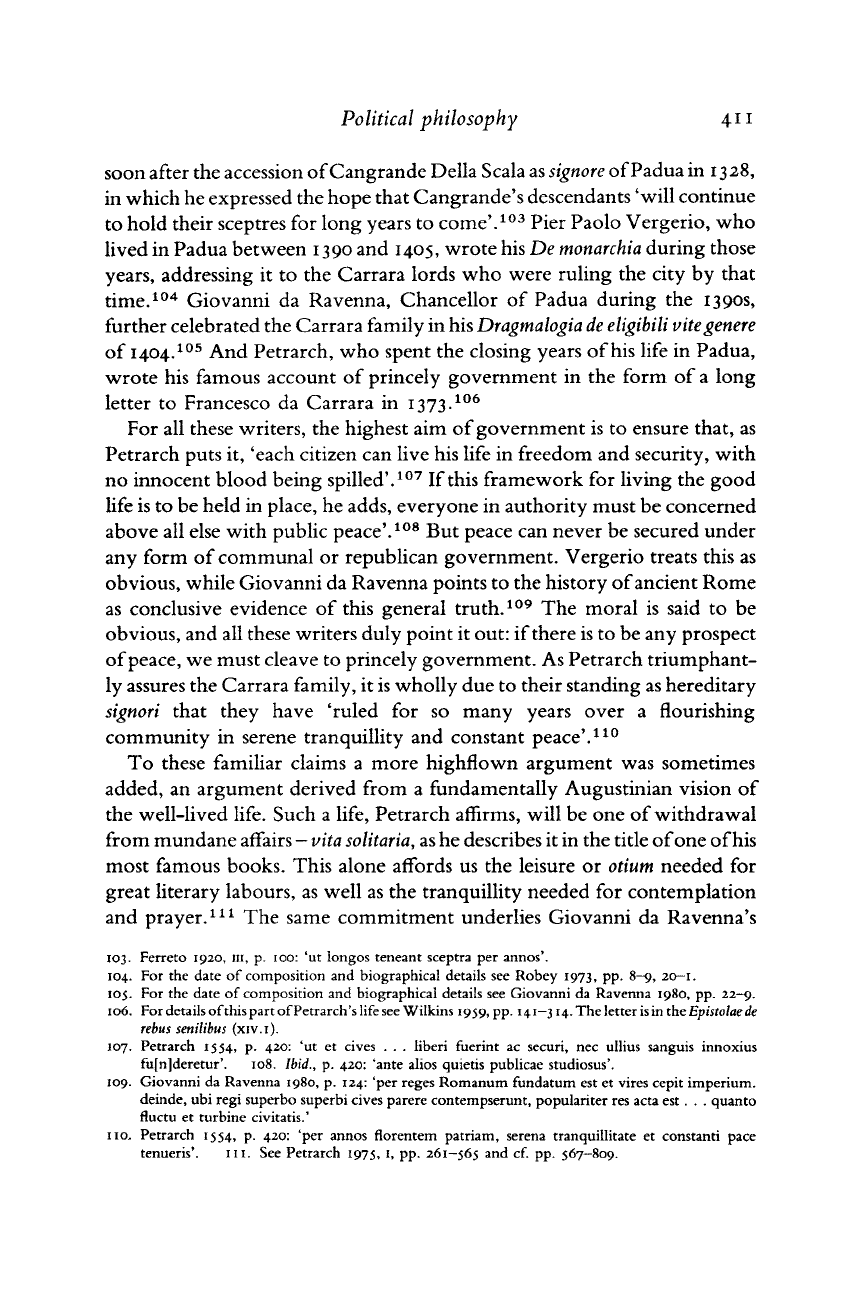
Political
philosophy
411
soon
after the accession
of
Cangrande
Delia
Scala
as
signore
of
Padua
in
1328,
in which he expressed the hope that Cangrande's descendants
'will
continue
to
hold
their sceptres for
long
years to come'.
103
Pier Paolo Vergerio, who
lived
in Padua between
1390
and
1405,
wrote his De
monarchia
during those
years,
addressing it to the
Carrara
lords who were ruling the city by that
time.
104
Giovanni da Ravenna, Chancellor of Padua during the
1390s,
further
celebrated the
Carrara
family in his
Dragmalogia
de
eligibili
vitegenere
of
1404.
105
And
Petrarch,
who spent the
closing
years of his
life
in Padua,
wrote his famous account of princely government in the form of a
long
letter
to Francesco da
Carrara
in
1373.
106
For
all these writers, the highest aim of government is to ensure that, as
Petrarch
puts it, 'each citizen can
live
his
life
in freedom and security,
with
no innocent
blood
being
spilled'.
107
If
this framework for
living
the good
life
is to be
held
in place, he adds, everyone in authority must be concerned
above all
else
with
public peace'.
108
But peace can never be secured under
any form of communal or republican government. Vergerio treats this as
obvious,
while
Giovanni da Ravenna points to the history
of
ancient Rome
as conclusive evidence of this general truth.
109
The moral is said to be
obvious, and all these writers duly point it out:
if
there
is to be any prospect
of
peace,
we must cleave to princely government. As
Petrarch
triumphant-
ly assures the
Carrara
family, it is
wholly
due to their standing as hereditary
signori
that they have 'ruled for so many years over a flourishing
community in serene tranquillity and constant peace'.
110
To
these familiar claims a more
highflown
argument was sometimes
added, an argument derived from a fundamentally Augustinian
vision
of
the
well-lived
life.
Such a
life,
Petrarch
affirms,
will
be one of withdrawal
from mundane affairs
—
vita
solitaria,
as he describes it in the title
of
one
of
his
most famous books. This alone affords us the leisure or otium needed for
great
literary labours, as
well
as the tranquillity needed for contemplation
and
prayer.
111
The same commitment underlies Giovanni da Ravenna's
103.
Ferreto
1920, in, p. 100: 'ut
longos
teneant
sceptra
per
annos'.
104. For the
date
of
composition
and
biographical
details
see Robey 1973, pp. 8-9, 20-1.
105. For the
date
of
composition
and
biographical
details
see Giovanni da Ravenna 1980, pp. 22-9.
106. For
details
of
this
part of
Petrarch's
life
see
Wilkins
1959, pp. 141—314. The
letter
is in the Epistolae
de
rebus
senilibus
(xiv.i).
107.
Petrarch
1554, p. 420: 'ut et
cives
. . .
liberi
fuerint
ac
securi,
nec
ullius
sanguis
innoxius
fu[n]deretur\
108. Ibid., p. 420:
'ante
alios
quietis
publicae
studiosus'.
109. Giovanni da Ravenna 1980, p. 124: 'per
reges
Romanum
fundatum
est et
vires
cepit
imperium.
deinde,
ubi
regi
superbo
superbi
cives
parere
contempserunt,
populariter
res
acta
est. . .
quanto
fluctu
et
turbine
civitatis.'
no.
Petrarch
1554, p. 420: 'per
annos
florentem
patriam,
serena
tranquillitate
et
constanti
pace
tenueris'.
in. See
Petrarch
1975, 1, pp.
261-565
and cf. pp.
567-809.
Cambridge Histories Online © Cambridge University Press, 2008
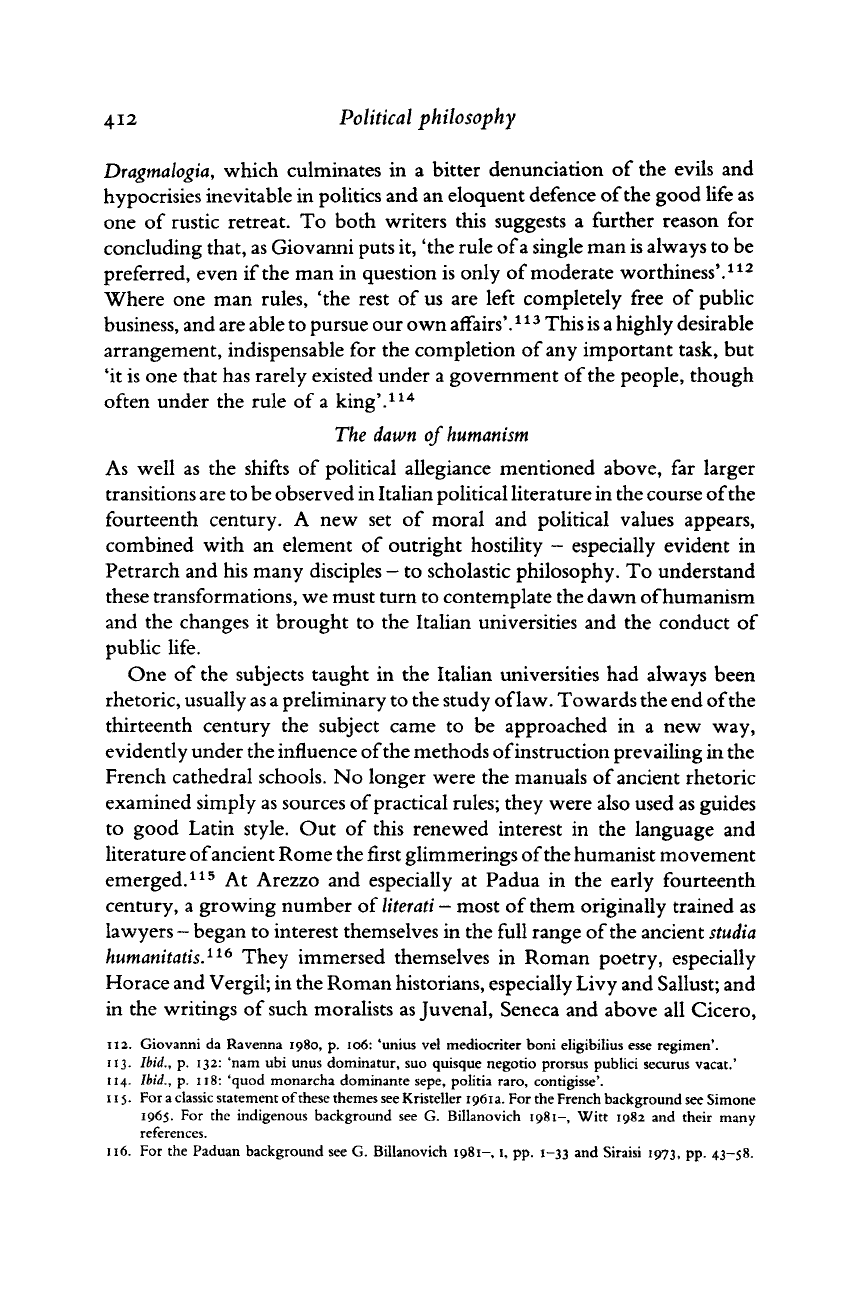
412
Political philosophy
Dragmalogia,
which culminates in a bitter denunciation of the
evils
and
hypocrisies inevitable in politics and an eloquent defence
of
the
good
life
as
one of rustic
retreat.
To both writers this suggests a further reason for
concluding that, as Giovanni puts it, 'the rule
of
a
single man is always to be
preferred,
even if the man in question is only of
moderate
worthiness'.
112
Where
one man rules, 'the rest of us are left completely free of public
business, and
are
able to pursue our own affairs'.
113
This is
a
highly desirable
arrangement,
indispensable for the completion of any important task, but
'it is one that has
rarely
existed under a government of
the
people, though
often under the rule of a king'.
114
The
dawn
of humanism
As
well
as the shifts of political allegiance mentioned above, far
larger
transitions
are
to be observed in
Italian
political
literature
in the
course
of
the
fourteenth
century. A new set of moral and political values appears,
combined with an element of outright hostility
—
especially evident in
Petrarch
and his many disciples - to scholastic philosophy. To understand
these
transformations,
we must turn to contemplate the dawn
of
humanism
and
the changes it brought to the Italian universities and the conduct of
public life.
One of the subjects taught in the Italian universities had always been
rhetoric,
usually
as
a
preliminary to the study
of
law.
Towards
the end
of
the
thirteenth
century the subject came to be approached in a new way,
evidently under the influence
of
the
methods
of
instruction
prevailing in the
French
cathedral schools. No longer were the manuals of ancient
rhetoric
examined simply as sources
of
practical
rules; they were also used as guides
to
good Latin style. Out of this renewed interest in the language and
literature of
ancient
Rome the first glimmerings
of
the
humanist movement
emerged.
115
At Arezzo and especially at Padua in the early fourteenth
century,
a growing number of
literati
- most of them originally trained as
lawyers - began to interest themselves in the full range of
the
ancient
studia
humanitatis.
116
They immersed themselves in Roman poetry, especially
Horace
and Vergil; in the Roman
historians,
especially Livy and Sallust; and
in the writings of such moralists
as
Juvenal,
Seneca and above all
Cicero,
H2. Giovanni da Ravenna 1980, p. 106:
'unius
vel
mediocriter
boni
eligibilius
esse
regimen'.
113.
Ibid., p. 132: 'nam ubi
unus
dominatur,
suo
quisque
negotio
prorsus
publici
securus
vacat.'
114.
Ibid., p. 118:
'quod
monarcha
dominante
sepe,
politia
raro,
contigisse'.
115.
For a
classic
statement
of
these
themes
see
Kristeller
1961a. For the
French
background
see
Simone
1965. For the
indigenous
background
see G.
Billanovich
1981-, Witt 1982 and
their
many
references.
116.
For the
Paduan
background
see G.
Billanovich
1981-, 1, pp. 1-33 and
Siraisi
1973, pp.
43-58.
Cambridge Histories Online © Cambridge University Press, 2008
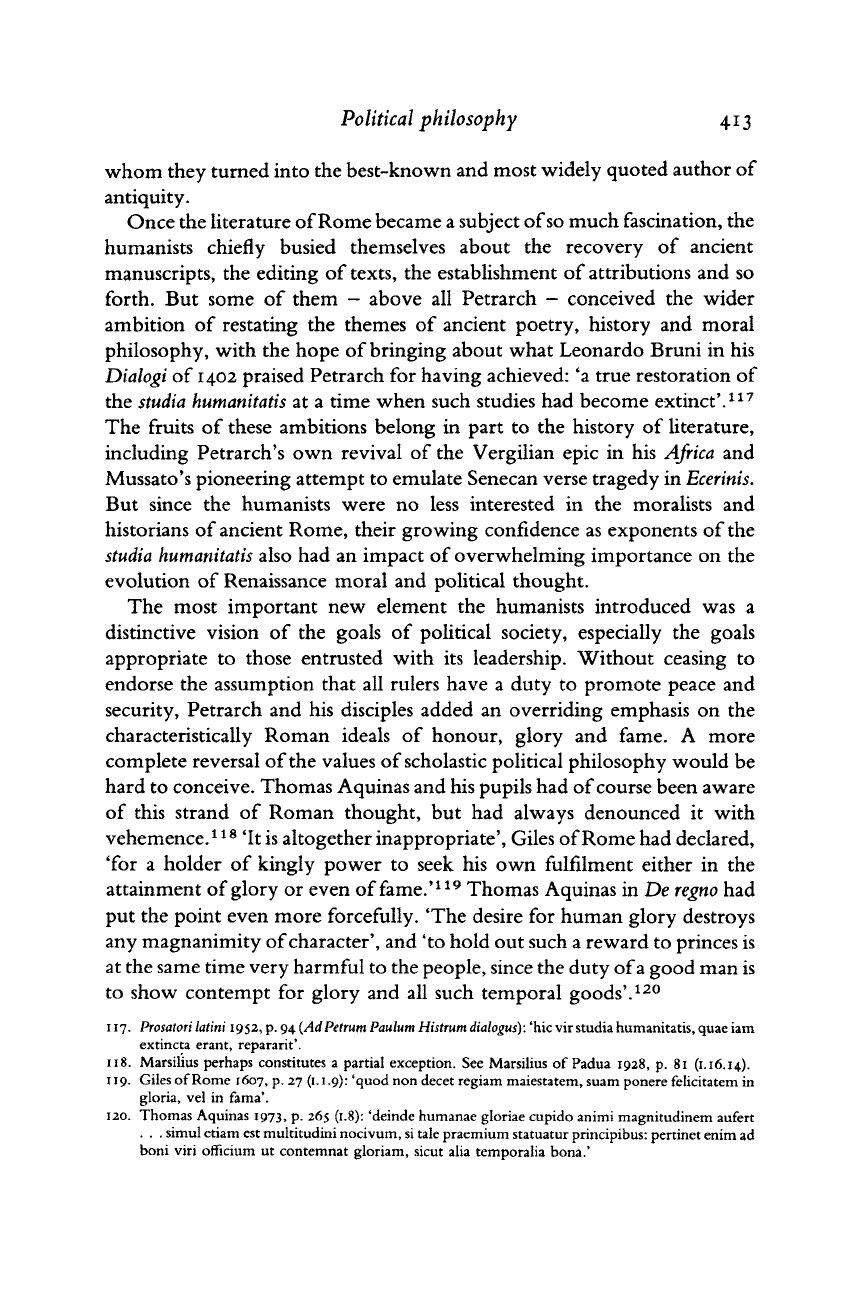
Political philosophy
413
whom they turned into the best-known and most
widely
quoted author of
antiquity.
Once
the
literature of
Rome
became a subject
of
so much fascination, the
humanists chiefly busied themselves about the recovery of ancient
manuscripts,
the editing of texts, the establishment of attributions and so
forth.
But some of them - above all
Petrarch
- conceived the wider
ambition of restating the themes of ancient poetry, history and moral
philosophy, with the hope of bringing about what Leonardo Bruni in his
Dialogi
of
1402
praised
Petrarch
for having achieved: 'a true restoration of
the
studia
humanitatis at a time when such studies had become extinct'.
117
The
fruits of these ambitions belong in
part
to the history of literature,
including
Petrarch's
own revival of the Vergilian epic in his
Africa
and
Mussato's pioneering attempt to emulate Senecan verse tragedy in
Ecerinis.
But
since the humanists were no
less
interested in the moralists and
historians of ancient Rome, their growing confidence as exponents of the
studia
humanitatis also had an impact of overwhelming importance on the
evolution of Renaissance moral and political thought.
The
most important new element the humanists introduced was a
distinctive
vision
of the goals of political society, especially the goals
appropriate
to those entrusted with its leadership. Without ceasing to
endorse the assumption that all rulers have a duty to promote peace and
security,
Petrarch
and his disciples added an overriding emphasis on the
characteristically
Roman ideals of honour, glory and fame. A more
complete reversal of the values of scholastic political philosophy would be
hard
to conceive. Thomas Aquinas and his pupils had
of
course
been aware
of
this strand of Roman thought, but had always denounced it with
vehemence.
118
'It is altogether
inappropriate',
Giles
of
Rome
had declared,
'for
a holder of kingly power to seek his own fulfilment either in the
attainment
of glory or even of fame.'
119
Thomas Aquinas in De
regno
had
put the point even more forcefully. 'The desire for human glory destroys
any
magnanimity
of
character',
and 'to hold out such a reward to princes is
at
the same time very harmful to the people, since the duty
of
a
good man is
to
show contempt for glory and all such temporal goods'.
120
117.
Prosatori latini 1952, p. 94 {AdPetrum Paulum Histrum dialogus): 'hie vir
studia
humanitatis,
quae
iam
extincta
erant,
repararit'.
118.
Marsilius
perhaps
constitutes
a
partial
exception.
See
Marsilius
of
Padua
1928, p. 81 (1.16.14).
119.
Giles
of
Rome
1607, p. 27 (1.1.9):
'quod
non
decet
regiam
maiestatem,
suam
ponere
felicitatem
in
gloria,
vel in
fama'.
120.
Thomas
Aquinas
1973, p. 265
(1.8):
'deinde
humanae
gloriae
cupido
animi
magnitudinem
aufert
.
. .
simul
etiam
est
multitudini
nocivum,
si
tale
praemium
statuatur
principibus:
pertinet
enim
ad
boni
viri
officium
ut
contemnat
gloriam,
sicut
alia temporalia
bona.'
Cambridge Histories Online © Cambridge University Press, 2008
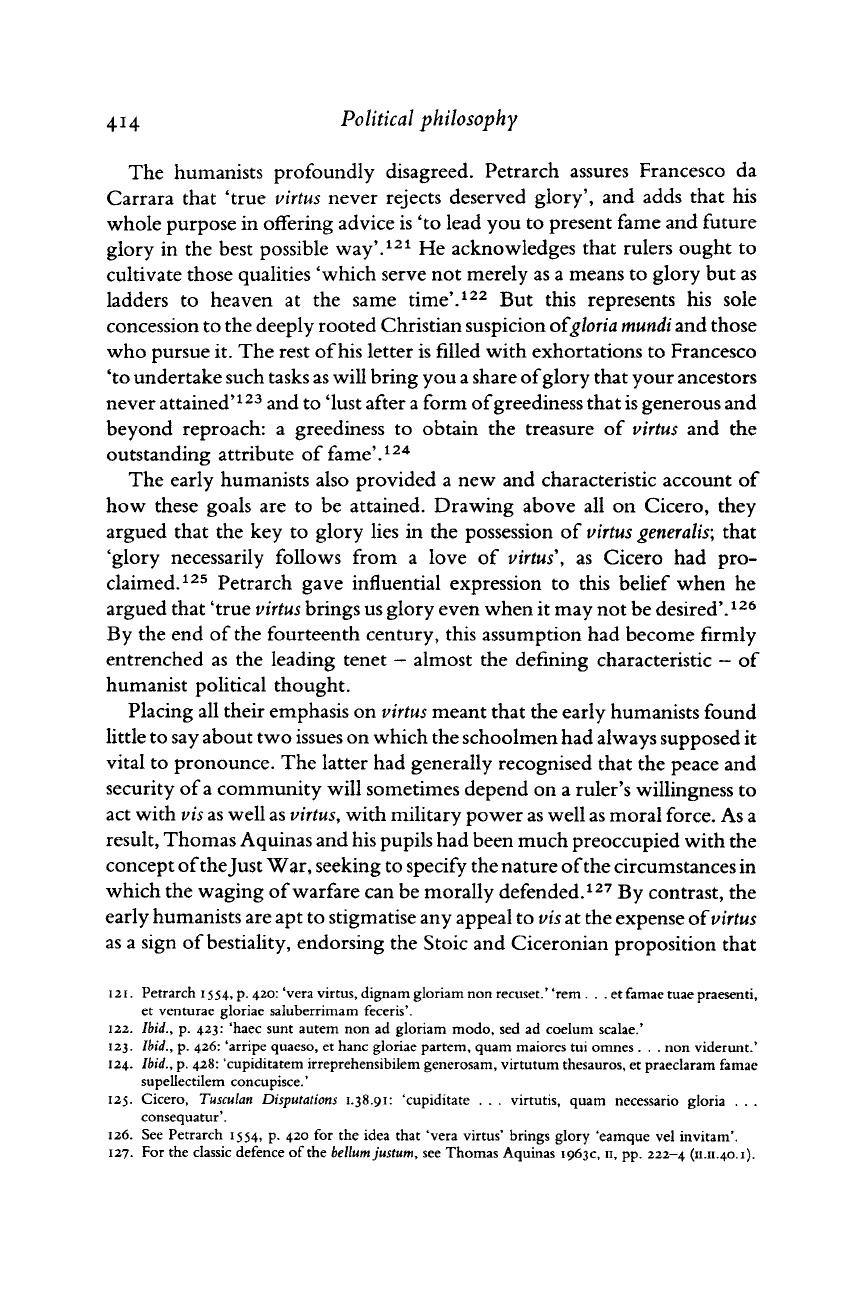
414
Political
philosophy
The humanists profoundly disagreed.
Petrarch
assures Francesco da
Carrara
that 'true virtus never rejects deserved glory', and adds that his
whole
purpose in offering advice is 'to lead you to present fame and future
glory in the best
possible
way'.
121
He acknowledges that rulers ought to
cultivate those qualities 'which serve not merely as a means to glory but as
ladders to heaven at the same time'.
122
But this represents his
sole
concession to the deeply rooted Christian suspicion
of
gloria
tnundi and those
who pursue it. The rest
of
his letter is
filled
with
exhortations to Francesco
'to undertake such tasks as
will
bring you
a
share
of
glory that your ancestors
never attained'
123
and to 'lust after a form
of
greediness that is generous and
beyond reproach: a greediness to obtain the treasure of virtus and the
outstanding attribute of fame'.
124
The early humanists also provided a new and characteristic account of
how these goals are to be attained. Drawing above all on Cicero, they
argued
that the key to glory
lies
in the
possession
of virtus
generalise
that
'glory necessarily
follows
from a
love
of virtus', as Cicero had
pro-
claimed.
125
Petrarch
gave influential expression to this belief
when
he
argued
that 'true virtus brings us glory
even
when
it may not be desired'.
126
By
the end of the fourteenth century, this assumption had become firmly
entrenched as the leading tenet
—
almost the
defining
characteristic
—
of
humanist political thought.
Placing all their emphasis on virtus meant that the early humanists found
little to say about two
issues
on which the schoolmen had always supposed it
vital to pronounce. The latter had generally recognised that the peace and
security
of
a
community
will
sometimes depend on a ruler's
willingness
to
act
with
vis as
well
as virtus,
with
military power as
well
as moral force. As a
result, Thomas Aquinas and his
pupils
had been much preoccupied
with
the
concept
of
the
Just
War,
seeking
to specify the
nature
of
the circumstances in
which the waging
of
warfare
can be morally defended.
127
By contrast, the
early
humanists
are
apt to stigmatise any appeal to vis at the expense
of
virtus
as a
sign
of bestiality, endorsing the Stoic and Ciceronian proposition that
121.
Petrarch
1554, p. 420:
'vera
virtus,
dignam
gloriam
non
recuset.'
'rem. . . et
famae
tuae
praesenti,
et
venturae
gloriae
saluberrimam
feceris'.
122. Ibid., p. 423:
'haec
sunt
autem
non ad
gloriam
modo,
sed ad
coelum
scalae.'
123. Ibid., p. 426:
'arripe
quaeso,
et
hanc
gloriae
partem,
quam
maiores
tui
omnes
. . . non
viderunt.'
124. Ibid., p. 428:
'cupiditatem
irreprehensibilem
generosam,
virtutum
thesauros,
et
praeclaram
famae
supellectilem
concupisce.'
125.
Cicero, Tusculan Disputations
1.38.91:
'cupiditate
. . .
virtutis,
quam
necessario
gloria
. . .
consequatur'.
126. See
Petrarch
1554, p. 420 for the
idea
that
'vera
virtus'
brings
glory
'eamque
vel
invitam'.
127.
For the
classic
defence
of the bellum justum, see
Thomas
Aquinas
1963c,
11,
pp.
222-4
(n.n.40.1).
Cambridge Histories Online © Cambridge University Press, 2008
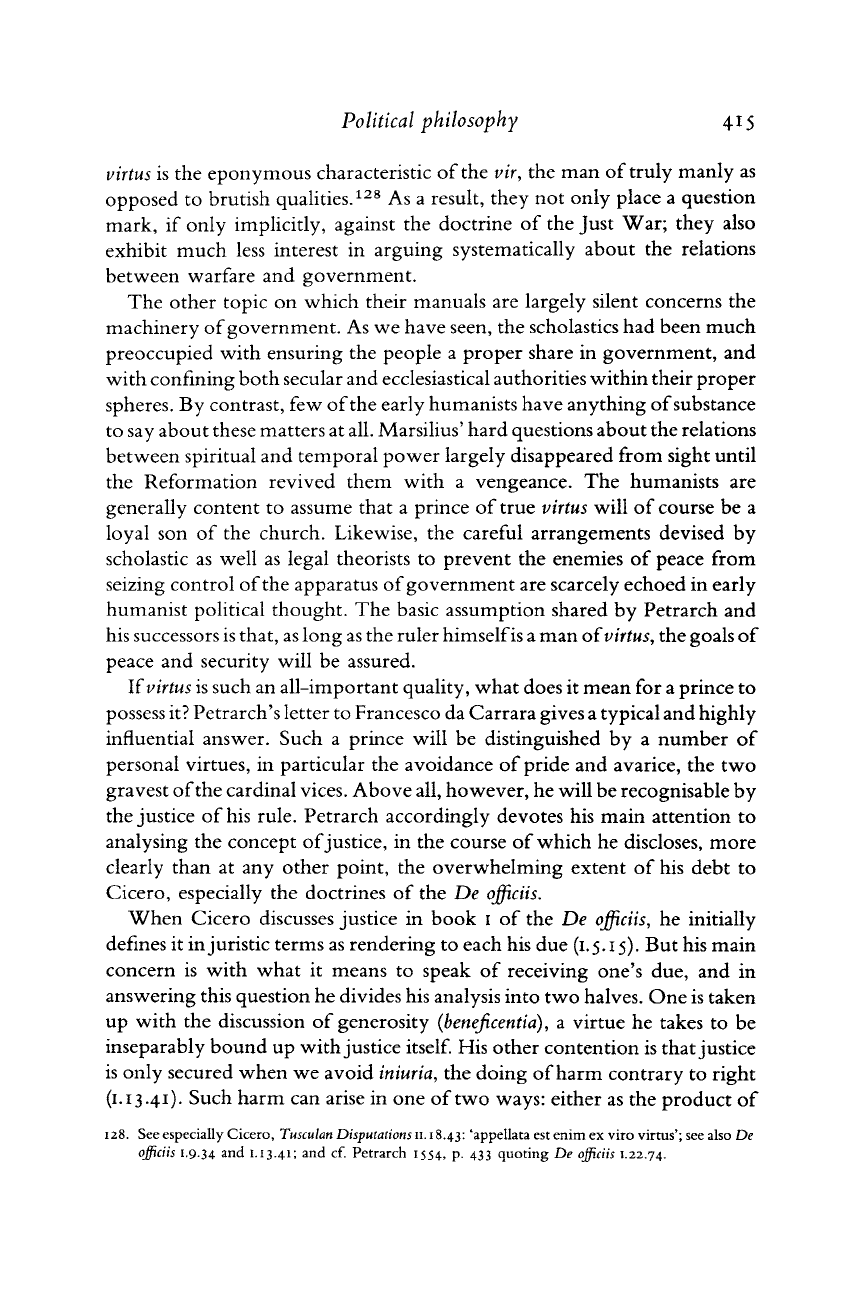
Political
philosophy
415
virtus is the eponymous characteristic of the vir, the man of truly manly as
opposed to brutish qualities.
128
As a result, they not
only
place a question
mark,
if
only
implicitly, against the doctrine of the
Just
War; they also
exhibit much
less
interest in arguing systematically about the relations
between warfare and government.
The other topic on which their manuals are largely
silent
concerns the
machinery
of
government. As we have seen, the scholastics had
been
much
preoccupied
with
ensuring the people a proper share in government, and
with
confining
both secular and ecclesiastical authorities
within
their proper
spheres. By contrast, few
of
the early humanists have anything
of
substance
to say about these
matters
at all. Marsilius' hard questions about the relations
between spiritual and temporal power largely disappeared from sight until
the Reformation revived them
with
a vengeance. The humanists are
generally content to assume that a prince of true virtus
will
of course be a
loyal son of the church. Likewise, the careful arrangements
devised
by
scholastic as
well
as legal theorists to prevent the enemies of peace from
seizing
control
of
the apparatus
of
government are scarcely echoed in early
humanist political thought. The basic assumption shared by
Petrarch
and
his successors is that, as
long
as the
ruler
himself is a man ofvirtus, the goals of
peace and security
will
be assured.
If
virtus is such an all-important quality, what
does
it mean for a prince to
possess
it?
Petrarch's
letter to
Francesco
da
Carrara
gives
a
typical and
highly
influential answer. Such a prince
will
be
distinguished
by a number of
personal virtues, in particular the avoidance of pride and avarice, the two
gravest
of
the cardinal vices. Above all, however, he
will
be recognisable by
the justice of his rule.
Petrarch
accordingly devotes his main attention to
analysing the concept
of
justice, in the course of which he discloses, more
clearly
than at any other point, the overwhelming extent of his debt to
Cicero,
especially the doctrines of the De
officiis.
When Cicero discusses justice in book 1 of the De
officiis,
he initially
defines
it in
juristic
terms as rendering to each his due
(1.5.15).
But his main
concern
is
with
what it means to speak of receiving
one's
due, and in
answering this question he
divides
his analysis into two halves. One is taken
up
with
the
discussion
of generosity
(benejicentia),
a virtue he takes to be
inseparably bound up
with
justice
itself.
His other contention is
that
justice
is
only
secured
when
we avoid
iniuria,
the
doing
of
harm
contrary
to right
(1.13.41).
Such harm can arise in one of two ways: either as the product of
128. See
especially
Cicero, Tusculan Disputations
11.18.43:
'appellata
est
enim
ex
viro
virtus';
see
also
De
officiis
1.9-34
and 1.13.41; and cf.
Petrarch
1554, p. 433
quoting
De officiis 1.22.74.
Cambridge Histories Online © Cambridge University Press, 2008
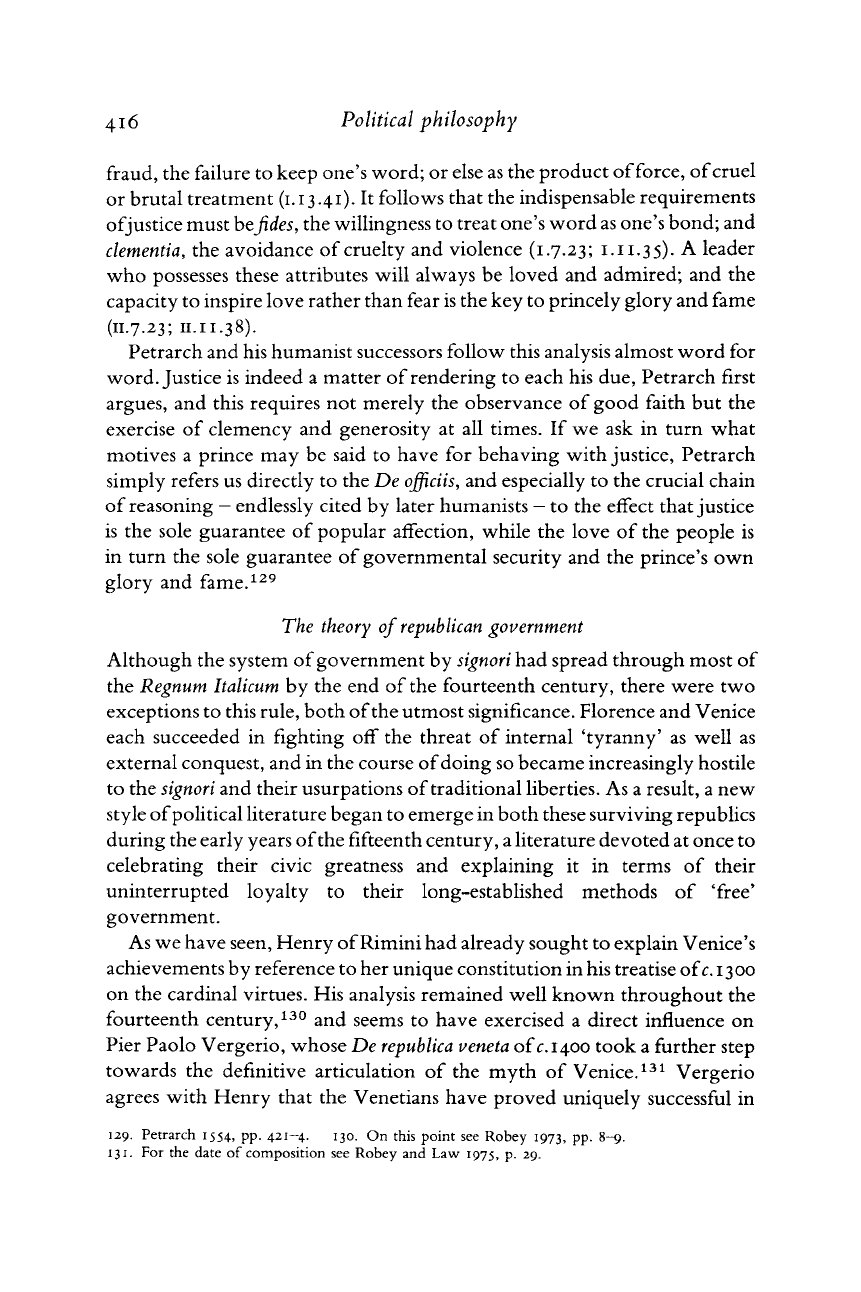
416
Political
philosophy
fraud,
the failure to keep
one's
word; or
else
as the product
of
force,
of
cruel
or
brutal treatment (i.
13.41).
It
follows
that the indispensable requirements
of
justice must
befides,
the
willingness
to
treat
one's
word as
one's
bond; and
dementia,
the avoidance of cruelty and violence
(1.7.23; 1.11.35).
A leader
who
possesses
these attributes
will
always be
loved
and admired; and the
capacity
to inspire
love
rather
than fear is the key to princely glory and fame
(11.7.23; 11.11.38).
Petrarch
and his humanist successors
follow
this analysis almost word for
word. Justice is
indeed
a matter of rendering to each his due,
Petrarch
first
argues,
and this requires not merely the observance of good faith but the
exercise of clemency and generosity at all times. If we ask in turn what
motives a prince may be said to have for behaving
with
justice,
Petrarch
simply refers us directly to the De
officiis,
and especially to the crucial chain
of
reasoning
—
endlessly
cited by later humanists
—
to the effect that justice
is the
sole
guarantee of popular affection,
while
the
love
of the people is
in turn the
sole
guarantee of governmental security and the prince's own
glory and fame.
129
The
theory
of
republican
government
Although the system
of
government by
signori
had spread through most of
the Regnum Italicum by the end of the fourteenth century, there were two
exceptions to this rule, both
of
the utmost significance. Florence and Venice
each succeeded in
fighting
off the threat of internal 'tyranny' as
well
as
external
conquest, and in the course
of
doing
so became increasingly hostile
to the
signori
and their usurpations
of
traditional liberties. As a result, a new
style
of
political
literature
began to emerge in both these surviving republics
during the early years
of
the fifteenth century,
a
literature
devoted at once to
celebrating their civic greatness and explaining it in terms of their
uninterrupted loyalty to their long-established methods of 'free'
government.
As we have seen, Henry
of
Rimini had already sought to explain Venice's
achievements by reference to her unique constitution in his treatise
of c. 1300
on the cardinal virtues. His analysis remained
well
known
throughout the
fourteenth century,
130
and seems to have exercised a direct influence on
Pier
Paolo Vergerio,
whose
De
republica
veneta
of c. 1400
took a further step
towards the
definitive
articulation of the myth of Venice.
131
Vergerio
agrees
with
Henry that the Venetians have proved
uniquely
successful in
129.
Petrarch
1554, pp.
421-4.
130. On
this
point
see
Robey
1973, PP- 8-9.
131.
For the
date
of
composition
see
Robey
and Law 1975, p. 29.
Cambridge Histories Online © Cambridge University Press, 2008
